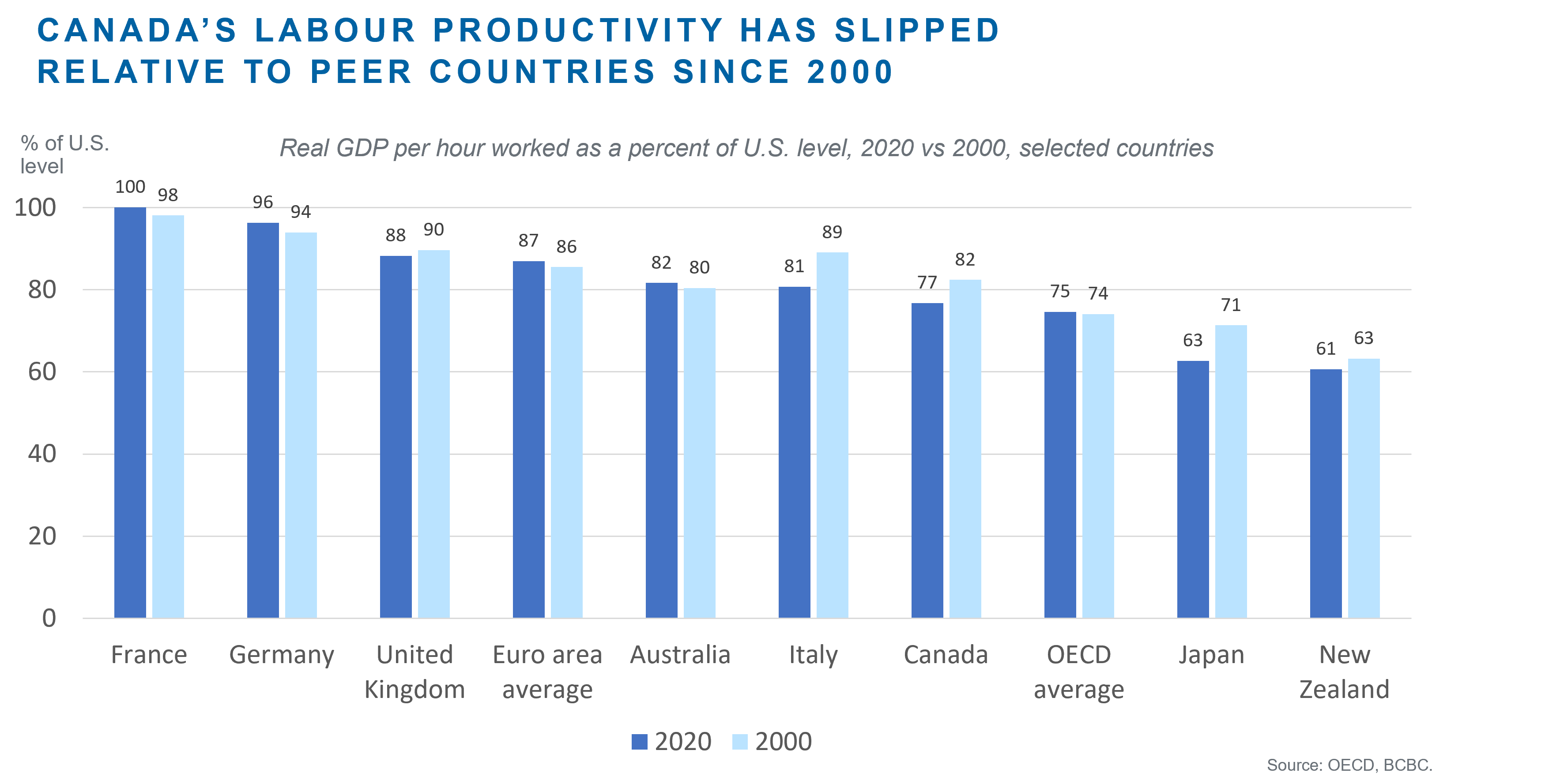Productivity lessons from Australia
Canada and Australia have a lot in common. We share resource based economies, English as a major language, and a federal political structure. We also share a dismal productivity record.
The graph below shows that Canada’s productivity rate has declined from 82 percent of the US level in 2000 to 77 percent of the US level in 2020. The dark blue line represents 2020, the light blue 2000.

Source: Business Council of BC.
The comparison with the US is useful, as the US is our major customer and competitor. Australia, in contrast, is in a very isolated location, closer to one definitely unfriendly superpower. Not surprisingly, then, Australians likely feel much more vulnerable than Canada does.
As for productivity, Australia’s in 2000 was similar to Canada’s, but has actually improved slightly since then. That is undoubtedly because Australia takes productivity very seriously. In 1998, an Act of Parliament created the country’s Productivity Commission to serve an independent authority.
It is described as an advisory body — not directly administering government programs or exercising executive power, but instead “providing quality, independent advice and information to governments, and on the communication of ideas and analysis." As an agency of the Australian Government, the Commission operates within the government’s treasury portfolio, although the scope of its activities extends to all levels of government and all sectors of the economy, including social and environmental issues.
With an annual budget of around CDN$29 million, the Commission appears to be well staffed and supported, capable of initiating its own research, which is published in reports intended to stimulate public discussion. The 2023 Productivity Commission Report, for example, groups 71 recommendations into 29 “Reform directives”, further arranged in eight categories. Those categories are listed below, together with a selection of the recommendations to give a flavour of the report
Building an adaptable workforce — education
Seven reform directives, along with recommendations to leverage digital technology in schools, apply best practices in teaching technology, adopt innovative schooling, grow access to tertiary education, better target investment in higher education, and expand student loan eligibility.
Building an adaptable workforce — migration
One reform directive, along with recommendations to better target skilled migrants, improve temporary migration, and create pathways to permanent residency.
Building an adaptable workforce — occupational licensing
Two reform directives, along with recommendations to reduce barriers faced by skilled migrants and make occupational licensing fit for purpose.
Building an adaptable workforce — workplace relations and platform work
Two reform directives, along with recommendations to fairly share returns on productivity improvements and introduce independent dispute resolution for platform (freelance or “gig”) workers.
Harnessing data, digital technology and diffusion
Four reform directives, along with recommendations to develop faster and more reliable internet, comply with cybersecurity measures, maximize the value of government data holdings, and actively promote the diffusion of new knowledge across the business community.
Creating a more dynamic economy
Five reform directives, along with recommendations to encourage entrepreneurship, create a better investment climate, address the lack of competitive market incentives in highly regulated sectors, use the tax system to invigorate productivity growth, and foster open trade and foreign investment.
Lifting productivity in the non-market sector
Three reform directives, along with recommendations to implement best practice resource allocation for public infrastructure, direct health funding to promote innovation, as well as promoting innovation in government agencies and regulators.
Securing net zero and adapting to a changing climate at least cost
Five reform directives, along with recommendations to create policy respecting private adaptation decisions, increase the integrity of carbon offsets, and pursue least-cost approaches in securing electricity supply.
It is interesting to note that all of these categories can be categorized as horizontal, applying across the whole economy, as opposed to a vertical approach that would target particular industries or sectors of the economy. It is also interesting to note the emphasis given to building an adaptable workforce — 12 of the 29 reform directives fall under this mandate.
Even more noteworthy, there is nothing about research and development, which Canadians regularly tout as the driver of productivity. Nor does the Commission comment on artificial intelligence, which will unquestionably have a major effect on productivity.
In conclusion, therefore, Australia’s demonstrated improvement in productivity offers lessons for Canada, including the importance of placing a strong emphasis on human capital, and the practical value of a dedicated body to evaluate this important concept in a comprehensive and public fashion.
Peter Josty is Executive Director of The Centre for Innovation Studies (THECIS), a Calgary-based not-for-profit research company specializing in innovation and entrepreneurship. In addition to working in private research and business development, he holds a PhD in chemistry from the University of London and an MBA from the International Institute for Management Development in Geneva. With particular thanks to Brian Wixted, for drawing attention to the topic of this month’s column.
R$
| Organizations: | |
| People: | |
| Topics: |
Events For Leaders in
Science, Tech, Innovation, and Policy
Discuss and learn from those in the know at our virtual and in-person events.
See Upcoming Events
You have 0 free articles remaining.
Don't miss out - start your free trial today.
Start your FREE trial Already a member? Log in
By using this website, you agree to our use of cookies. We use cookies to provide you with a great experience and to help our website run effectively in accordance with our Privacy Policy and Terms of Service.





